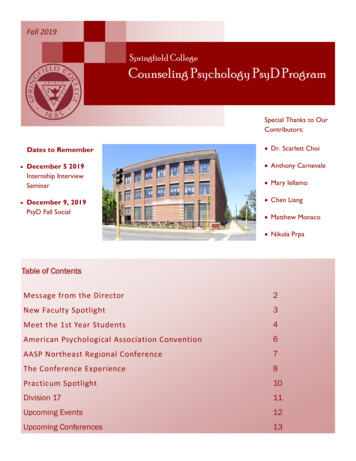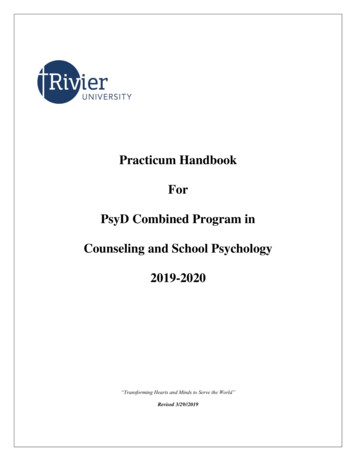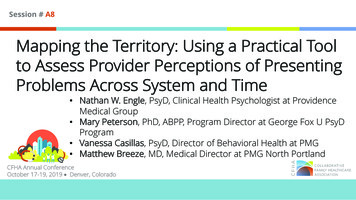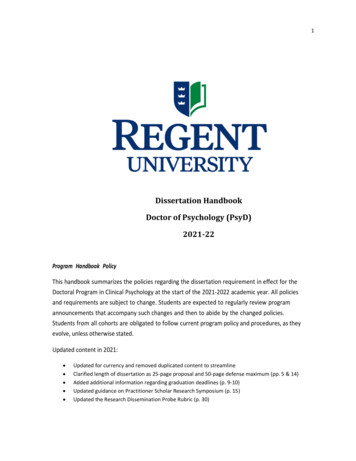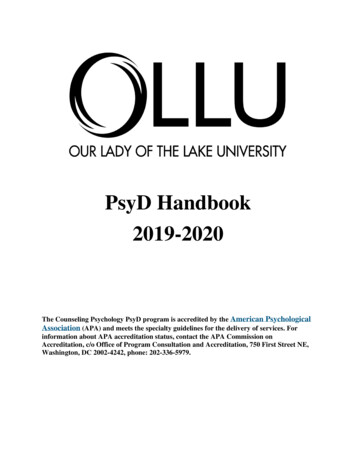
Transcription
PsyD Handbook2019-2020The Counseling Psychology PsyD program is accredited by the American PsychologicalAssociation (APA) and meets the specialty guidelines for the delivery of services. Forinformation about APA accreditation status, contact the APA Commission onAccreditation, c/o Office of Program Consultation and Accreditation, 750 First Street NE,Washington, DC 2002-4242, phone: 202-336-5979.
Table of ContentsTABLE OF CONTENTS2A NOTICE TO STUDENTS5COMPREHENSIVE EVALUATION OF STUDENT COMPETENCE6OUR LADY OF THE LAKE UNIVERSITY8HISTORYNON-DISCRIMINATION POLICY88DEPARTMENT OF PSYCHOLOGY9HISTORY OF THE DEPARTMENT OF PSYCHOLOGYADMINISTRATIVE STAFFCORE FACULTYASSOCIATED FACULTY99910DOCTOR OF PSYCHOLOGY IN COUNSELING PSYCHOLOGY14OVERVIEW OF THE PSYD PROGRAMSTUDENT OUTCOMESPRACTITIONER FOCUS141520ACADEMIC POLICIES21COURSE LOAD AND CONTINUOUS ENROLLMENTATTENDANCE POLICYINDEPENDENT STUDYCOURSE WAIVERSTRANSFER OF CREDITTIME LIMITATIONSLEAVE OF ABSENCEPETITION FOR EXCEPTION TO PROGRAM POLICIESPETITION FOR EXEMPTION FROM UNIVERSITY POLICIES212121212222222222PROGRAM REQUIREMENTS22CURRICULUM AND DEGREE PLANPRACTICUM REQUIREMENTSGENERAL POLICIESOFF-CAMPUS PLACEMENTSATTENDANCETOTAL HOURS REQUIREDPRACTICA LOGCLINICAL QUALIFYING EXAMINATIONWRITTEN QUALIFYING EXAMINATIONDOCTORAL CANDIDACYPRESENTATION OF PROFESSIONAL 829292
PsyD Handbook3DISSERTATION RESEARCHFINAL DEFENSEELECTRONIC SUBMISSION INSTRUCTIONSFEESPRE-DOCTORAL INTERNSHIPDEGREE COMPLETION303031323233COURSE/PRACTICUM SCHEDULING & REGISTRATION33ADVISINGCOURSE REGISTRATIONADD/DROP COURSESCLASS CANCELLATIONPRACTICUM REGISTRATIONDISSERTATION REGISTRATIONINTERNSHIP REGISTRATION33333333333434STUDENT EVALUATIONS34ANNUAL PERFORMANCE REVIEWCOURSE EVALUATIONSPRACTICUM EVALUATIONSGRADING POLICIESACADEMIC DISCIPLINE3435353536GRADUATE ASSISTANTSHIPS36PSYCHOLOGY GRADUATE STUDENT ASSOCIATION AND PSYCHOLOGY GRADUATE STUDENTASSOCIATION, RAINBOW COALITION36GRIEVANCE PROCEDURES36STUDENT COMPLAINTS/CONCERNSREMEDIATION AND APPEALS POLICIESCONSEQUENCES OF UNSATISFACTORY ACADEMIC PERFORMANCEPROBATION AND TERMINATIONPSYCHOTHERAPEUTIC REMEDIATIONAPPEALING A COURSE GRADE OR OTHER FORMAL EVALUATION393939404040COMPLIANCE WITH UNIVERSITY AND PROFESSIONAL REGULATIONS AND STANDARDS41RATIONALEACADEMIC DISHONESTY AND PLAGIARISM4141TITLE IX STATEMENT41STUDENT IMPAIRMENT42REPORTING IMPAIRMENTDECIDING ON A COURSE OF ACTIONSTUDENT FOLLOW-THROUGHAPPEALS PROCESS42434343REFERENCES44
PsyD Handbook4APPENDIX A: COMPLETION OF REQUIREMENTS FOR THE PSYD DEGREE45PSYD DEGREE PLAN46APPENDIX C (1): TYPICAL COURSE SEQUENCE48APPENDIX C (2): TYPICAL PSSSP COURSE SEQUENCE49APPENDIX D: TITLE PAGE FORMAT FOR DISSERTATIONS50APPENDIX E: DISSERTATION GUIDELINES51APPENDIX G: SUGGESTED DISSERTATION FORMAT--QUALITATIVE54APPENDIX H: EVALUATION OF PRACTICUM STUDENTS56APPENDIX I: OFF-SITE PRACTICUM EVALUATION FORM58APPENDIX J: SUPERVISOR EVALUATION FOR PSYD STUDENTS SUPERVISING MS STUDENTS 60APPENDIX K: EVALUATION OF PRACTICA SUPERVISORS63APPENDIX L: CLINICAL QUALIFYING EXAM QUESTIONS65APPENDIX M: WRITTEN QUALIFYING EXAM QUESTIONS75APPENDIX N: CHANGE OF ADVISOR REQUEST76APPENDIX O: INTERNSHIP APPLICATION APPROVAL FORM77APPENDIX P: OFF-CAMPUS PRACTICUM PLACEMENT FORM79APPENDIX Q: TRANSFER OF CREDIT FORM80APPENDIX R: IRB APPROVAL REQUEST81APPENDIX S: PSYD PRACTICUM LOG3APPENDIX T: PETITION FOR EXCEPTION84APPENDIX U: Annual Student Evaluation80
A Notice to StudentsThe PsyD Handbook is not meant to supersede any of the policies and codes of conduct in OurLady of the Lake University’s (OLLU) Student Handbook, the Ethics Code of the AmericanPsychological Association (APA) (www.apa.org/ethics), or the jurisprudence rules of the TexasState Board of Examiners of Psychologists (wyw.tsbep.state.tx.us). Students are expected to haveread these documents prior to beginning their coursework.OLLU and the Psychology Department reserve the right to delete, add, or change courses in thisPsyD Handbook and in the Degree Plan for any reason and cannot guarantee enrollment inspecific courses or sections. The University also reserves the right to effect changes to tuitionand fees without notice.The faculty of the Psychology Department encourages students to place an emphasis on theirown development. During the course of their tenure in the Program, students will haveopportunities to examine the relationship between self-development and professionalcompetency. Some courses may include experiential components designed to foster student selfexamination in relation to course content, competencies, and professional development. Coursesand practica may include material and activities that require personal exploration aboutpsychological, social, and cultural processes of human behavior.The faculty members of the PsyD program adhere to the Ethics Code of the APA and respect therights of our students. The faculty reserves the right to request a student to engage in apsychotherapeutic relationship and may require such a relationship as a condition for remediationor re-admittance into the Program.Students must be aware that there are many personal and professional reasons that may prohibitthem from earning a PsyD or becoming licensed to practice psychology in the State of Texas.Therefore, the faculty of the Program cannot guarantee either graduation from the program orlicensure in the State of Texas. However, we will make every effort to meet our obligations toeach student to give them every opportunity to accomplish their goals.I understand that my educational success is a joint effort between the faculty and me, theoutcomes of which cannot be guaranteed. Progress depends on many factors including mymotivation, effort, and other life circumstances. I agree that I will be responsible for adhering toall of the policies in this PsyD Handbook and the Student Handbook of Our Lady of the LakeUniversity. I also agree to adhere to the Ethics Code of the American Psychological Association.http://www.apa.org/ethics/code/Student SignatureDateStudent’s Printed Name5
Comprehensive Evaluation of Student CompetenceProfessional psychologists are expected to demonstrate competence within and across a numberof different but interrelated dimensions. Because programs that educate and train professionalpsychologists also strive to protect the public and profession, faculty, training staff, andsupervisors in such programs have a legitimate and vested interest in the comprehensiveevaluation of students in the profession-wide competences and discipline specific knowledgethat prepares students for further training in health service psychology to include multipleaspects of development and functioning (e.g., cognitive, emotional, psychological, interpersonal,technical, and ethical).Not all students understand or appreciate that multiple aspects of their professional developmentand functioning (e.g., cognitive, emotional, psychological, interpersonal, technical, and ethical)will be evaluated throughout the process of education and training in professional psychologyprograms (e.g., doctoral, internship, postdoctoral). Such comprehensive evaluation is necessaryin order for faculty, training staff, and supervisors to appraise the professional development andcompetence of their students. This policy language attempts to (a) disclose and make theseexpectations explicit for students at the outset of education and training, and (b) provide anopportunity for students to determine whether they do or do not wish to participate in suchprocesses and experiences.As such—and consistent with a range of oversight, professional, ethical, and licensure guidelinesand procedures that are relevant to processes of training, practice, and the assessment ofcompetence within professional psychology—the APA Council of Chairs of TrainingCouncils developed the following model policy for the comprehensive evaluation of students inprofessional training programs (for more information about the history and rationale of thispolicy see document “The Comprehensive Evaluation of Student-Trainee Competence inProfessional Psychology Programs” Student-Competency.pdfStudents and trainees in professional psychology programs (at the doctoral, internship, orpostdoctoral level) should know—prior to program entry, and at the outset of training—that faculty, training staff, supervisors and administrators have a professional, ethical, andpotentially legal obligation to: (a) establish criteria and methods through which aspects ofcompetence other than, and in addition to, a student-trainees’ knowledge or skills may beassessed (including, but not limited to, emotional stability and well being, interpersonalskills, professional development and personal fitness for practice); and (b) ensure—insofar as possible—that the student-trainees who complete their programs are competentto manage future relationships (e.g., client, collegial, professional, public, scholarly,supervisory, teaching) in an effective and appropriate manner. Because of thiscommitment, and within their parameters of their administrative authority, professionalpsychology education and training programs, faculty, training staff, supervisors andadministrators strive not to advance, recommend, or graduate students or trainees withdemonstrable problems (e.g., cognitive, emotional, psychological, interpersonal,technical, and ethical) that may interfere with professional competence to other programs,the profession, employers, or the public at large.6
PsyD Handbook7As such, within a developmental framework, and with due regard for the inherent powerdifference between students and faculty, students and trainees should know that theirfaculty, training staff, and supervisors will evaluate their competence in areas other thancoursework, seminars, scholarship, comprehensive examinations, or related programrequirements. These evaluative areas include, but are not limited to, demonstration ofsufficient: (a) interpersonal and professional competence (e.g., the ways in whichstudents relate to clients, peers, faculty, allied professionals, the public, and individualsfrom diverse backgrounds or histories); (b) self-awareness, self-reflection, and selfevaluation (e.g., knowledge of the content and potential impact of one's own beliefs andvalues on clients, peers, faculty, allied professionals, the public, and individuals fromdiverse backgrounds or histories); (c) openness to processes of supervision (e.g., theability and willingness to explore issues that either interfere with the appropriateprovision of care or impede professional development or functioning); and (d) resolutionof problems or issues that interfere with professional development or functioning in asatisfactory manner (e.g., by responding constructively to feedback from supervisors orprogram faculty; by participating in personal therapy in order to resolve issues orproblems).
Our Lady of the Lake UniversityHistoryOur Lady of the Lake University was founded by the Sisters of the Congregation of DivineProvidence, a religious order founded in 18th century Lorraine, France. Members of theCongregation arrived in Texas in 1866, where they initially established themselves in Austin in1866, and then in Castroville in 1868.The order continues as the sponsoring organization of theUniversity.By 1895 educational programs were started at the current site of the main campus of Our Lady ofthe Lake University. The first college program began in 1911 as a two-year curriculum forwomen. In 1919 the curriculum was expanded to four years and the institution was admitted tomembership in the Texas Association of Colleges.Our Lady of the Lake became, in 1923, the first San Antonio institution of higher education toreceive regional accreditation; it is accredited by the Commission on Colleges of the SouthernAssociation of Colleges and Schools. In 1927 it became the third Texas school to be approved bythe American Association of Universities.Graduate work, begun in 1942, was coeducational from its inception; all programs became fullycoeducational in 1969. In 1975 the name of the institution was changed from Our Lady of theLake College to Our Lady of the Lake University of San Antonio.Living up to its mission of providing education to those with limited access, the Universityintroduced Weekend College to Texas in 1978, starting in San Antonio. The undergraduateWeekend College was expanded to Houston in 1986 followed by graduate and MBA programswith complete class schedules on weekends. The Dallas Weekend College was opened in 1994and later added graduate degrees and the MBA. Today the University’s scheduling alternativesinclude summer sessions, daytime and evening classes at its main campus in San Antonio, aswell as undergraduate and graduate weekend degree programs in San Antonio, Houston, and theRio Grande Valley. The University has articulation agreements with community colleges in SanAntonio, Houston, Dallas, and El Paso.Our Lady of the Lake University currently offers bachelor’s degrees in 56 areas of study,master’s degrees in 21 areas of specialization, and doctorates in Counseling Psychology andLeadership Studies.Non-Discrimination PolicyOur Lady of the Lake University provides equal employment opportunities to all qualifiedapplicants and employees without regard to their race, color, ancestry, religion, gender (exceptwhere gender is a bona fide occupational qualification), sexual orientation, age, national origin,veteran status, disability, genetic information, or any other characteristic or status that isprotected by federal or Texas law. The University’s policy is to ensure that recruitment, hiring,training, education, promotion and all other employment actions, such as compensation, benefits,transfers, layoffs, return from layoff, tuition reimbursement, social and recreational programs areadministered in accordance with these protections for all employees.8
Department of PsychologyHistory of the Department of PsychologyThe Department of Psychology began by offering undergraduate degrees. The Master of Science(MS) in Psychology programs were developed in the 1980s. The current master’s concentrationsinclude Marriage and Family Therapy and School Psychology. The Doctor of Psychology(PsyD) in Counseling Psychology program began admitting students in Fall 1990. TheCounseling Psychology program has been accredited by the American Psychological Association(APA) since 1995.Administrative StaffMs. Gayla Murr, Office Manager, Community Counseling Service. 590 N. General McMullen,(210) 434-1054. Prior to joining the CCS staff in 2007, Ms. Murr worked for the Hill CountryCommunity MHMR for seventeen years as a Business Manager for clinics in Junction, Llanoand Fredericksburg.Core FacultyDr. Monte Bobele, ABPP Professor (Emeritus), Moye 416, 434-6711 x 2492Dr. Bobele earned his BS, MA and PhD (Psychology) from the University of Houston. Dr.Bobele taught at OLLU 1981-1984 and rejoined the faculty in 1989. The graduate courses he hastaught include Systemic Approaches to Counseling, Introduction to Health Psychology, DoctoralColloquium, Qualitative Research Methods, Supervision, Psychological Hypnosis, ProfessionalWriting, Strengths-Based Approaches to Psychotherapy, and Practicum. He supervises at theCCS and his theoretical orientation is systemic, and strengths-based. Dr. Bobele’s researchinterests include walk-in/single session therapy, supervision and training, systemic therapy,health psychology, multicultural psychology, qualitative research methods, and post-modernapproaches to psychotherapy.Dr. Kevin Harris, Assistant Professor, Moye 405Dr. Harris earned his BA in Psychology from Indiana University Kokomo, his MS in Counselingand Counselor Education from Indiana University Bloomington, and his PhD in CounselingPsychology from Ball State University. He is a Licensed Psychologist (LP) in Texas, a HealthService Psychologist (HSP), and a National Certified Counselor (NCC). He joined the OLLUfaculty in 2018 after teaching for five years at the University of Texas of the Permian Basin andworking for four years as an addictions counselor. He has taught graduate courses in AdvancedEthical and Professional Issues, Psychopathology, Intellectual Assessment, PersonalityAssessment, and the Psychology of Religion and Spirituality. His research interests are in thepsychology of religion and spirituality, the psychology of music, assessment of faith, and campussexual assault prevention.9
PsyD Handbook10Dr. Bernadette Hassan-Solórzano, Professor, Director of the Community Counseling Service,Coordinator of MS & undergraduate practica. Community Counseling Service, (210) 434-1054.Dr. Solórzano received her BA (English) from the University of Texas at San Antonio and herMS (Psychology) and PsyD (Counseling Psychology) from Our Lady of the Lake University. Dr.Solórzano joined the OLLU faculty in 2002. The courses she has taught include Practica, Prepracticum Lab, Psychotherapy with Children, Adolescents, & Their Families, Introduction toSystemic Approaches to Counseling, Violence Prevention and Intervention, ProfessionalWriting, Qualitative Research I, and Supervision. Dr. Solórzano supervises in the CCS and hertheoretical orientation is Narrative Therapy. Her research interests are the impact of immigrationissues on Families, Torture Survivors, Ethics, and Training and Supervision.Dr. Deborah Healy, Associate Professor, PsyD Training Director,Psychology Department Chair, Moye 412 (210) 431-6711 x7118Dr. Healy earned her BA from Syracuse University (Utica College campus), her Masters at TheState University of New York at Albany and her Doctorate from Our Lady of the LakeUniversity. Dr. Healy began her career in 1976, as a high school English teacher in New York.She worked for the Northside Independent School District in San Antonio, TX from 1986 to2014. She served as a Reading Specialist, School Counselor, and Director of the District'sGuidance & Counseling Program. She is a Licensed Psychologist in Texas and a TX LicensedProfessional Counselor and TEA-Certified School Counselor. The graduate courses she hastaught include: Positive Psychology, Child and Adolescent Counseling, History and Systems ofPsychology, and Consultation. Her theoretical orientation is systemic, strengths-based.Dr. Healy's research interests include positive psychology, the use of expressive arts modalitiesin psychotherapy, and strength-based approaches to psychotherapy.Dr. Kristin O’Donnell, Assistant Professor, Moye 407, 210-434-6711 x 8197.Dr. O’Donnell received her doctoral degree in Educational Psychology at Texas A & MUniversity, Commerce. She earned her MS in Psychology (School Psychology concentration)from Our Lady of the Lake University. Graduate courses she has taught include PsychologicalMeasurement and Evaluation, Psychological Assessment, Achievement Testing andIndividualized Assessment, Autism Assessment, Lifespan Developmental Psychology, AppliedLearning and Development, Professional Practice: Skills and Issues, Counseling Skills in SchoolSettings, and school psychology practicum and internship. Her professional interests includedassessment and intervention in the early childhood and school age population. Her researchinterests include parent satisfaction with assessment and special education services, researchbased educational and behavioral interventions, and Autism Spectrum Disorders.Associated FacultyDr. Kathryn Anderson, Professor. Moye 410, 434-6711 x 2495Dr. Anderson received her BA from Trinity University and her MA and PhD (SocialPsychology) from the University of Missouri-Columbia. The graduate courses she has taughtinclude Social Psychology and Quantitative Research Design. Her research interests centeraround environmental, social, gender and personality effects on aggression, as well asevolutionary and social structural explanation of mate attraction.
PsyD Handbook11Dr. Joan Biever, Professor & Associate Provost. Main 102,(210) 431-4008Dr. Biever earned her BS from Ball State University, and her MA and PhD (CounselingPsychology) from the University of Notre Dame. She joined the OLLU faculty in 1990. Thegraduate courses she has taught include Introduction to Systemic Approaches to Counseling,Psychotherapy with Children, Adolescents, & Their Families, Pre-practicum, Practicum, FamilyProcesses Across Cultures, Sociocultural Foundations of Counseling Latinos, and StrengthsBased Approaches to Psychotherapy. Dr. Biever supervises at the CCS and uses strengths-basedapproaches to therapy. Her research interests include psychotherapy outcomes using strengthsbased approaches, multicultural issues, and training biliterate therapists.Dr. Jimena Castro Assistant Professor of Psychology, Moye 402, 210-434-6711Jimena earned her MS and PhD (Marriage and Family Therapy) from Nova SoutheasternUniversity in Fort Lauderdale, Florida. She is an AAMFT supervisor candidate and a licensedmarriage and family therapist in the state of Florida. Her professional and research interestsinclude Ericksonian hypnotherapy, brief and post-modern approaches to therapy, and qualitativeresearch methods. Jimena is joining the OLLU faculty in August 2018.Dr. Jacqueline Coppock, Director of the OLLU Counseling Center Providence HallDr. Coppock received her PsyD from Our Lady of the Lake University and became the Directorof the OLLU Counseling Center in 2019. She teaches some special topics courses in the summerand supports dissertation research.Dr. Maria De La Cruz, Assistant Professor, Moye 403, 434-6711 x 3926. Dr. De La Cruz earnedher Bachelors of Arts from the University of Texas at Austin, her Masters of Arts in ClinicalPsychology from St. Mary’s University in San Antonio, and her PhD in Educational Psychologyfrom The University of Texas at Austin. She began her professional career as a Science teacherin the Edgewood Independent School District, and had subsequent stints as School Psychologist,therapist, consultant and as Director of a charter school within a residential treatment facility.The courses she has taught include Life Span Development, Introductory Psychology, ChildDevelopment, Cognitive Psychology, Research Methods, Learning Frameworks, Psychology inthe Classroom, and Counseling 1. Her professional service and research interests includeeffective teaching and counseling with abused children and adolescents, best practices withposttraumatic stress disorder in children, the role of children in family therapy, and addressingthe mental health of special needs children and youth.Dr. John P. Gómez, Professor. Moye 408, 434-6711 x 2728Dr. Gomez earned his BA from St. Mary's University and his MA and PhD (ClinicalPsychology) from the University of Michigan at Ann Arbor. The graduate courses he has taughtinclude Experimental Design and Statistics, Seminar in Cognitive and Behavior Therapy, andResearch Methods and Procedures. His research interests include mental health diagnoses andclinical judgment, especially the diagnostic relevance of race/ethnicity; intergroup relations andstigmatization involving ethnic minorities (race) and women (gender); and measurement andpsychometrics, especially questionnaire design.
PsyD Handbook12Dr. Cynthia González, Professor and MS School Psychology Program Director Moye 414,434-6711 x 8152. Dr. González earned her BS from Pan American University, her M.Ed. fromSouthern Methodist University, and her PhD in School Psychology / Educational Psychologyfrom Texas A & M University-College Station. She has served schools as a Bilingual SchoolPsychologist, county mental health agencies as a post hospitalization therapist, and psychiatrichospitals as a consultant and aftercare specialist, and as an Inpatient Adolescent UnitPsychologist. Currently, she is a Professor and Director of the School Psychology GraduateProgram. The graduate courses she has taught include Life Span Development, Cognition,Psycho-Educational Testing, Psychological Assessment, Projective Assessment, BilingualAssessment, Assessment in Health Psychology, Intellectual Assessment, Operation andOrganization in Schools, Ethics in Professional Practice, Consultation in Schools, Language andPsychosocial Variables in Assessment and Therapy with Latino Populations (English andSpanish formats). She coordinates off-site placement and training for School PsychologyPracticum and Internships. Her professional service and research interests include assessmentand intervention with children and their families, consultation and collaboration with communitymental health and educational organizations, the role of spirituality in mental health, and culturaland language variables in services to Spanish speakers.Dr. Loranel (Lane ) Pace, Professor. Moye 401, 210-434-6711, ext. 2489.Dr. Pace earned her BA from the University of Texas at San Antonio (Psychology) and MA andPhD from University of Louisville (Cognitive Psychology). Her research interests include:Individual differences in cognition, interactions between language and cognitive processes. Shehas taught the following courses: Statistics, Research Methods, Cognition, Learning, Perception,Introductory PsychologyDr. Brenda Guerrero, Professor. Moye 417, 210-434-6711 x 2488.Dr. Guerrero earned her BA from the University of Cincinnati and her MA and PhD(Developmental Psychology) from Bowling Green State University. The graduate courses shehas taught include Life Span Developmental Psychology and Special Topics in Psychology ofAging, Death & Dying, and Social Gerontology. Her professional interests include gerontology,death & dying, and cancer research.Dr. Ezequiel Peña, Assistant Vice President for Academic Affairs & Global and StrategicInitiatives, and Director, Center for Mexican American Studies & Research. Moye 215,(210) 431-4148Dr. Peña received his BA in Psychology from Trinity University and his PhD in CounselingPsychology from The University of Texas at Austin. Dr. Peña joined the OLLU faculty inAugust 2008. He has taught Doctoral Colloquium I & II, Theories of Multicultural Counseling,Latina/o Psychology (English & Spanish sections), PrePracticum Counseling Lab: BasicInterviewing Skills (Bilingual section), and Professional Writing II. A major area of interest forDr. Peña is in working with the multicultural issues in counseling. He is interested in socialconstructionist, multicultural, and interdisciplinary approaches to counseling practice,supervision, teaching, theory, and research. Dr. Peña has worked in various university counseling
PsyD Handbook13center and community mental health center (CMHC) settings, including an inner-city CMHCserving various Latino/a and Latin American communities.Dr. Carlos Ramos, Assistant Professor of Psychology, Moye 400, 210-434-6711CarlosRamos earned his BA in psychology from Florida International University, his Masters inMovement Science from Barry University, and is in progress of completion of his PhD inMarriage and Family Therapy from Nova Southeastern University. As a board certified behavioranalyst, Mr. Ramos worked with the foster care population in South Florida for approximatelyten years. He also specializes in medical family therapy, in which he incorporates relationalhypnosis in the treatment of a wide range of clinical problems. Trained as a post-moderntherapist, his theoretical orientation is grounded in Ericksonian and systemic concepts. Mr.Ramos’s research interests include systemic approaches, clinical hypnosis, single-sessiontherapy, supervision and training, multicultural therapy, and qualitative research.Other Contributors- Psychologists working as Adjunct Instructors at OLLUDr. Arnold Slive. 210-431-3914Dr. Slive is a Texas Licensed Psychologist who earned his BS (Psychology) from the Universityof Illinois and his PhD (Clinical Psychology) from Indiana University. He joined the OLLUfaculty in 2007. Prior to that he was the clinical director of a large agency in Calgary AlbertaCanada where he was also in private practice. He is a licensed psychologist in Texas and anAAMFT Clinical Fellow and Approved Supervisor. The graduate courses he has taught includeTheoretical Foundations of Psychotherapy, Advanced Systemic Approaches to Counseling,Managing Private Practice, Postmodern Perspectives in Psychotherapy, Child and AdolescentCounseling and Theories of Group Psychotherapy. He supervises at the CCS and his theoreticalorientation is systemic, strengths-based. His research interests include single session therapy,strength-based approaches to psychotherapy, residential treatment and adolescence.
Doctor of Psychology in Counseling PsychologyOverview of the PsyD ProgramThe PsyD is a professional degree, preparing students for careers in the professional practice ofhealth service psychology. The first PsyD program in the United States began admitting studentsin the late 1960s. At the Vail Conference in 1973, the APA endorsed the PsyD model as analternative to the PhD in the training of individuals who offer direct psychological services. Thecontent of the PsyD program is consistent with guidelines specified at the Vail Conference fortraining programs in counseling psychology.As a professional program in Health Service Psychology, specifically in Counseling Psychology,the PsyD at OLLU emphasizes the direct delivery of professional services and the evaluation andimprovement of such services. Further, the program adheres to the principles outlined in theAmerican Psychological Association’s Specialty Guidelines for the Delivery of Services (1981).The Guidelines define Counseling Psychology as the practice ofprinciples, methods, and procedures for facilitating effective functioning during the lifespan developmental process. In providing such services, counseling psychologistsapproach practice with a significant emphasis on positive aspe
PsyD Handbook 2019-2020 The Counseling Psychology PsyD program is accredited by the American Psychological Association (APA) and meets the specialty guidelines for the delivery of services. For . Because programs that educate and train professional psychologists also strive to protect the public and profession, faculty, training staff, and

